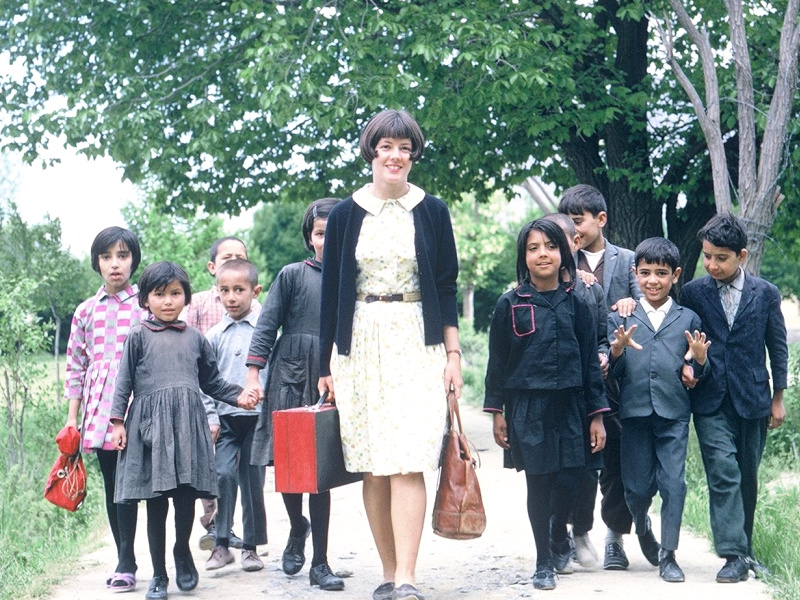 Louise in Kabul, walking home from singing class, 1968
Louise in Kabul, walking home from singing class, 1968
Can You Stop the Birds From Singing?
The Afghan Children’s Songbook
& the Power of Music
by Louise M. Pascale
This story begins in 1966; the setting is Afghanistan. I realize many of you have not had the opportunity to travel across the globe to a place now commonly thought of only as a desolate, poor country plagued by years of war and terrorism. I offer this story as a way to perhaps shift your perspective about Afghanistan and Afghans, and, if nothing else, to deepen your thinking about the role music plays for us personally and for the larger community. The experience I’m about to share with you brought me to a new depth of understanding about the essentialness of music for each and every one of us. Perhaps it will for you, too.
I spent from 1966 to 1968 in the Peace Corps in Afghanistan, teaching music to young children. I returned to the States with a small music book in hand, one that I had created with the help of an Afghan poet and musician. The book contained sixteen traditional Afghan children’s songs. Close to the end of my Peace Corps term, the Kabul Press kindly agreed to print several hundred copies of the book that they distributed to elementary schools in and around Kabul. I received one copy, which I brought home and stored away for safekeeping.
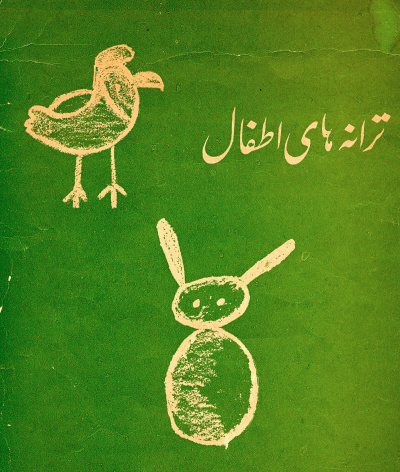 Cover of original songbook
Cover of original songbook
In 2002, thirty-four years later, disturbing news began to filter back to the United States that turned my world upside down. Stories emerged about the enforcement of severe music censorship in Afghanistan under the Taliban (Solomon 2002).
I viewed photos of instruments being destroyed, cassette tapes hung in effigy in city squares, and Afghans being beaten for making any kind of musical sound. The censorship was so extreme that mothers were not allowed to hum to their young children. This imposed decree was in place for over a decade. My mind raced back to those children I sang with. I wondered how anyone could possibly exist without music, no less an entire country. The idea seemed impossible to fathom. What long-term impact would this have on the entire Afghan culture? My heart sank at the thought of it all.
Upon hearing this news I went immediately in search of my one old copy of the songbook I’d stored away long ago. Memories rushed back as I leafed through the pages, recalling my visits to local schools, sharing songs with children. Like children everywhere, they delighted in singing together and making their own illustrations with my limited supply of crayons. I couldn’t comprehend those children being forced into silence.
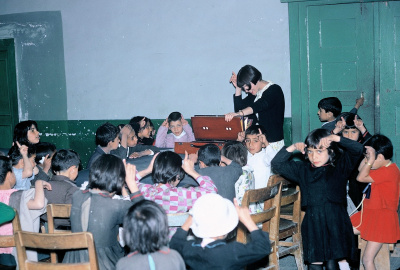 Louise singing “Ali Baba” with children, Kabul, 1968
Louise singing “Ali Baba” with children, Kabul, 1968
As I held my now very torn and faded songbook in my hands, I had a sinking feeling that these sixteen traditional children’s songs could possibly be close to complete eradication from the cultural memory. Given the severity of the censorship, perhaps this small collection was all that remained. At that moment, I determined that somehow I would return the songs to the children of Afghanistan. That’s where they belonged.
Having committed myself to this task, I was then faced with its implementation. The next four years were hectic. Simply copying my old songbook was not feasible. I madly engaged in fundraising to support the music production and a new book design. There were many moments when I questioned whether this project would ever really happen, but the incredible support from the Afghan community kept my spirits up. I consulted with Afghans I knew who lived in the United States and in Canada, continuously asking their advice. After all, the songs were theirs—not mine. I sent them copies of my old songbook and in every instance their reaction was the same: they not only supported the project unanimously and encouraged me to go forward, but were often moved to tears simply by seeing childhood songs they hadn’t thought about in years.
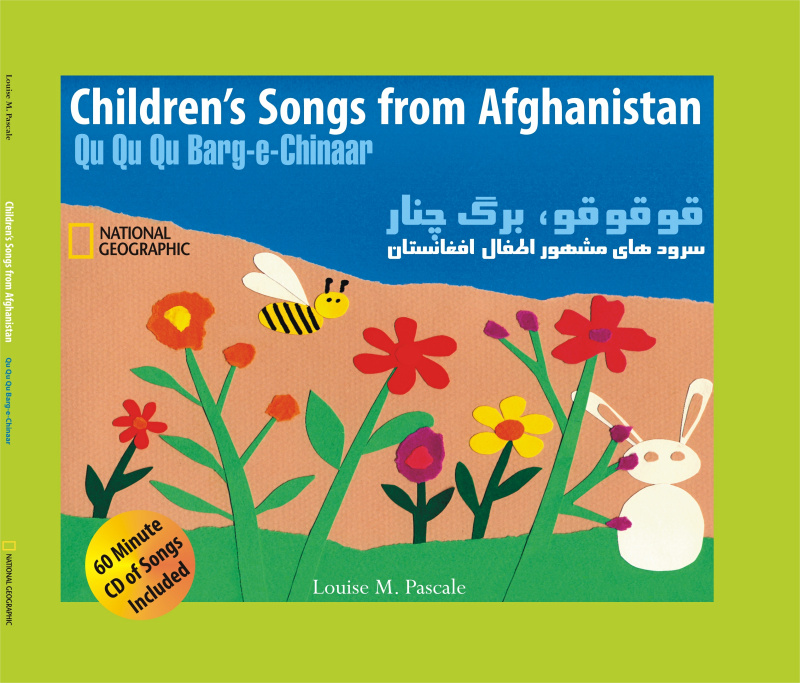
By March 2007, thanks to many generous individuals and organizations, the first three thousand copies of Qu Qu Qu Barg-e-Chinaar: Children’s Songs from Afghanistan, based on my original songbook, were printed and distributed to schools across Afghanistan. Each songbook included some of the children’s original illustrations as well as a CD and a cassette tape.
The Afghan Embassy in Washington, DC, hosted a release party to officially launch the new songbook. Two hundred Afghans attended the event. After I shared the story of the project, the evening concluded with a video of Afghan children singing the last song from the songbook, “Mardume Afghanaim,” which translates to “Afghan People.” It’s a familiar, old folksong, uplifting and similar to “This Land Is Your Land” in that it speaks of the extraordinary beauty of Afghanistan and the ways in which Afghans are united as one people in one land.
“Afghan People” (“Mardume Afghanaim”), 2006
The video began to play, and the room became silent. Suddenly one woman in the crowd shouted out, “We all know this song. We should all be singing.” Instantly, all 200 Afghans raised their voices in song. I turned to face the crowd, moved by hearing their voices. What I witnessed made my heart stop. Every person in that room was not only joyfully singing but each and every one had tears rolling down their cheeks. Musical memories had been restored, voices unleashed, the silence broken. The 200 Afghans in that room, while singing a simple childhood song, had made connections to their homeland and to memories far beyond what I could imagine. I had never experienced this kind of musical phenomenon, and it made a profound difference in my understanding of the transformative power that music has in all our lives. I, too, was moved to tears.
 Girls from Kunduz performing “Salaam, Salaam” – a Hazaragi song
Girls from Kunduz performing “Salaam, Salaam” – a Hazaragi song
While on sabbatical in 2009, I returned to Afghanistan to evaluate the project and determine next steps. In my two-month stay, I traveled to several schools and orphanages talking to many educators, administrators, parents, and children. I returned from that trip with some major insights and new goals for the project. First, it became very apparent to me that these children’s songs, in fact all music, held great importance in Afghan culture. I discovered that the reaction to hearing the songs was similar, no matter whether the listener was a soldier, taxi driver, parent, or teacher. Their faces would light up with a bright smile and they’d thank me profusely for returning their songs to the children. The songs jogged memories and inspired stories, instantly connecting them to another time and place. The songs are in various ethnic languages—e.g., Dari, Pashto, Hazaragi, and Uzbeki—yet everyone enjoyed singing them, even those they were not as familiar with. The music helped strengthen relationships between ethnic groups and build community, not only crossing but also breaking down boundaries.
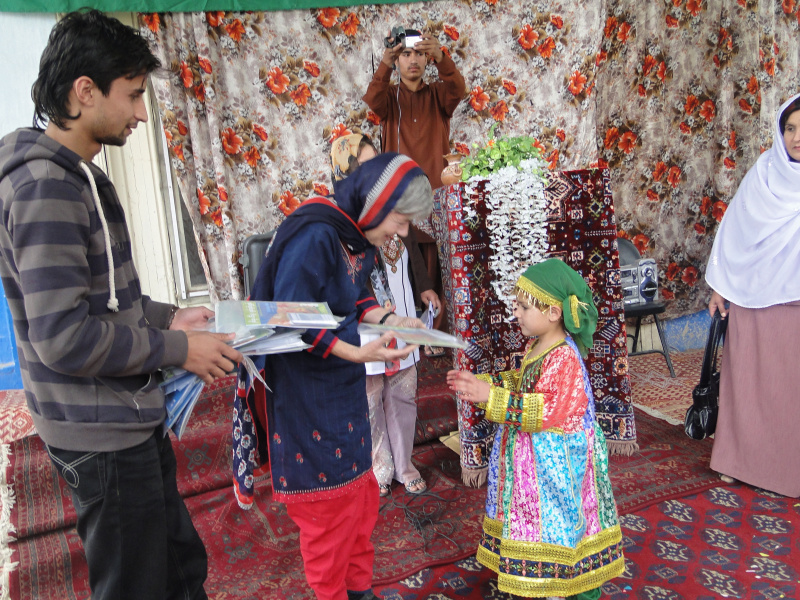 Louise with assistant Rauf distributing songbooks to the children at the kindergarten in Kunduz, 2009
Afghan children from the Small Heaven orphanage singing the “Alphabet Song,” 2009
Louise with assistant Rauf distributing songbooks to the children at the kindergarten in Kunduz, 2009
Afghan children from the Small Heaven orphanage singing the “Alphabet Song,” 2009
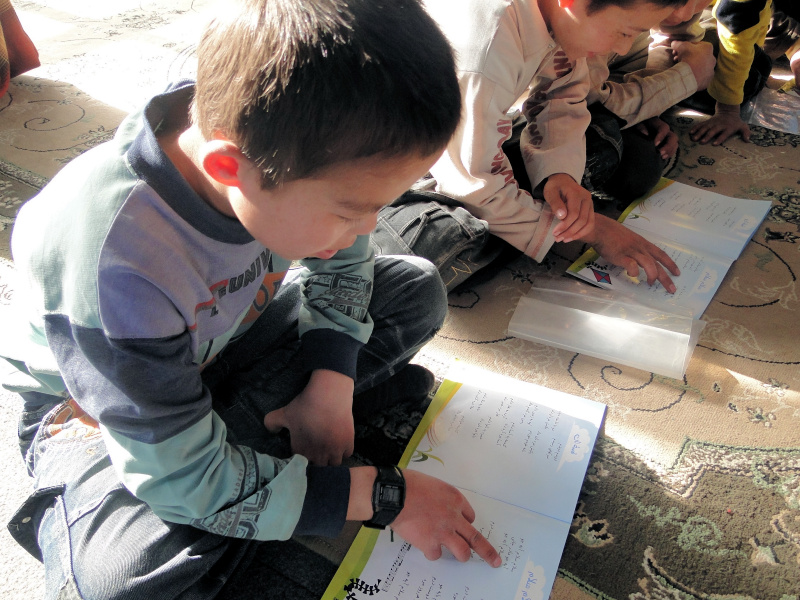 Children in Small Heaven Orphanage in Kabul singing and reading lyrics
Children in Small Heaven Orphanage in Kabul singing and reading lyrics
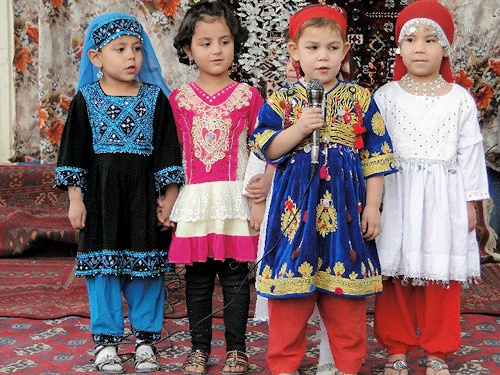 Kindergarten children in Kunduz performing one of the songs, 2009
Kindergarten children in Kunduz performing one of the songs, 2009
Second, it was clear there was a desperate need for more resources in schools. I often visited schools where the children had no books at all and the songbook provided an invaluable educational resource. It became obvious we needed to print more books. In fact, everyone expressed the desire to have a second songbook with even more traditional songs. Finally, as I traveled around the country, I made a point of visiting schools where the children had previously received books. Much to my delight, I witnessed children not only singing, but diligently reading the lyrics. I had always hoped the project would connect music and literacy, and there it was! I saw an opportunity to link the two.
I returned home, determined to find funding to print more songbooks, create a second songbook, and also create an accompanying teacher’s guide that would include several simple lessons for each song—much-needed teaching strategies that would honor the rich Afghan musical heritage and also enhance basic literacy skills.
By 2013 a second songbook, Awasana See Sana, and an accompanying teacher’s guide for each of the two songbooks had been published. Teachers in Afghanistan were enormously appreciative to finally have an educational resource that outlined strategies for strengthening critical thinking, problem solving, and creativity as well as basic reading and writing skills. This generation of children is the hope for Afghanistan’s future. Literacy is crucial.
Currently more than 50,000 copies of the songbooks have been distributed to schools and orphanages across Afghanistan. The project’s goal is to produce a third songbook and perhaps begin to collect traditional folk tales, which are also disappearing. Teacher resources will be included with all these publications.
After I returned from Kabul in 2009, a group of teachers at the Jack Jackter School, in Colchester, Connecticut, chose to use the Afghan Children’s Songbook project as their fifth grade school service learning project, providing an opportunity for their students to learn Afghan children’s songs as well as deepen their cultural understanding of Afghanistan and the Afghan people. At the culminating event, attended by family and friends, the students shared Afghan songs and dances, recited original poetry about Afghanistan, and displayed homemade Afghan kites.
After the performance, one teacher confessed that at the onset of the project there were a few students reluctant to participate in this endeavor, questioning its value. “Why are we learning these Afghan songs anyway?” they asked. “Don’t we hate the Afghans? Aren’t they our enemies?” These reactions were easily understandable. Several children had family members serving in the military in Afghanistan, and many had viewed media reports of the war and recurring violence. The teachers, aware of these concerns, seized the opportunity and designed carefully planned lessons where multiple perspectives on Afghan culture were presented, directly addressing the assumptions and misgivings voiced by their students. They read books from an Afghan child’s viewpoint and watched recent videos of Afghan children singing in schools. In the end, the project made a significant impact on not only the students but the entire school community. The music provided an opening for an honest discussion to take place and for concerns and misconceptions to be addressed. As a result, perspectives shifted, views were altered, barriers were removed, and cross-cultural connections were made. Students reported, “I was wrong about Afghans,” and “I learned that Afghan kids are just like us in many ways.”
The 200 Afghans in that room, while singing a simple childhood song, had made connections to their homeland and to memories far beyond what I could imagine.
This confirmed for me how essential it is that our students understand and embrace other cultures as well as their own. Music in education provides the perfect venue for doing exactly that. Chimamanda Ngoze Adichie, a well-respected Nigerian novelist, speaks eloquently of the “danger of the single story…. If we continue to show people as only one thing, over and over, it is what they become. It robs people of their dignity” (Adichie 2009). The Global Music Project concludes, “as we introduce the never-heard-before music of [other] cultures, we will affect not only how people see these cultures, but how they see themselves; as people identify with the human element of the music, an increased sense of global responsibility is inevitable” (Global Music Project 2011). As does any culture, Afghanistan and Afghans, often thought of only in terms of war and terror, deserve and need to be known through their own stories and music.
Most of us can’t imagine a day without music, or even twenty minutes. None of us can fathom over a decade of silence.
What can we, who care deeply about music, learn from this story? In my years of teaching, I have stressed the profound importance music has on our lives and the lives of children and families. Why, then, was I caught so by surprise by the tearful reaction of Afghans hearing their childhood songs? For one thing, I’ve never considered life without music. Most of us can’t imagine a day without music, or even twenty minutes. None of us can fathom over a decade of silence.
American school districts regularly eliminate music programs, claiming that they are not essential, too expensive, or unconnected to essential learning goals. Clearly the Taliban believed that music was more than frivolous or they would not have spent so much energy eliminating it and threatening people’s lives for uttering the faintest musical sound. Music is essential because it strengthens our souls, builds community, and gives voice to those needing to be heard. Music is not frivolous; it is an integrating force that maintains cultures and identities. How can we justify depriving children of something as crucial as their musical heritage? Our school populations are more diverse than ever, and it is imperative that we honor that diversity. We cannot afford not to have music!
If young birds do not hear their own music, if their parents are silenced or disappear, the music is lost.
John Bailey, in a 2001 presentation at the World Forum on Music Censorship, posed the question, “Can you stop the birds from singing?” (Bailey 2001). I posed this question to my daughter, an ornithologist. Can birds really stop singing? She replied, “Yes. Actually, they can. If young birds do not hear their own music, if their parents are silenced or disappear, the music is lost.” Each of us has a musical identity, a musical soundtrack, that must be held dearly and kept alive for future generations. We must value it, share it, and honor it. To each of you—thank you for your commitment to keeping the music alive. Tashakor.
Further Resources
For more information, visit the Afghan Children’s Songbook & Literacy Project, Inc. Qu Qu Qu Barg-e-Chinaar: Children’s Songs From Afghanistan is available on the website both in Dari and with English translations. A CD is included. Louise’s 2015 TEDx talk, Returning Music to the Children of Afghanistan, provides a detailed history of the initiative.